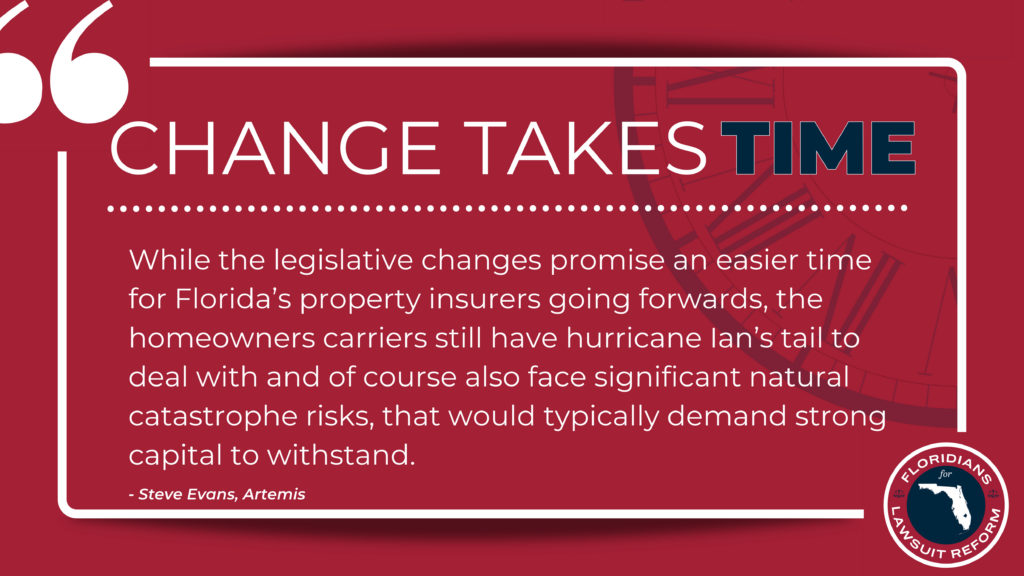
The Florida homeowners property insurance segment of the market is facing significant challenges after a costly year in 2022, which left the group of main carriers tracked by Fitch Ratings facing a 72% decline in shareholder’s equity.
Hurricane Ian has driven significant impacts, of course, but in addition all four of the main Florida homeowners carriers faced adverse reserve development in 2022 as well.
The Florida specialist homeowner property insurance group reported an annualised operating return of negative 78.2%, Fitch Ratings said in a recent report, with every insurer in the group reporting an operating loss for 2022.
While shareholder equity was down across most US personal lines re/insurance groups due to unrealised losses caused by devaluation of investment securities in 2022, Fitch explained that for the Florida homeowners’ insurer specialists shareholders’ equity slumped 72% after Hurricane Ian.
That will have resulted in a significant hit to capital and surplus, putting other carriers at threat and meaning higher reinsurance prices could become even more challenging to bear at this years renewals.
In 2022, the losses that Floridian insurers faced from hurricane Ian were exacerbated by, “an already-challenged environment with pervasive loss-cost escalation across the Florida property market,” Fitch ratings has explained.
In addition, the market endured liquidations of major insurance players during the period, as capital levels dwindled.
This has led to forecasts that more carriers could fail, either in the run up to the mid-year reinsurance renewals, or at the time if they cannot secure sufficient capital and coverage.
Adverse development reported by Florida’s homeowners insurers in 2022 was largely due to the strengthening of catastrophe reserves from prior year events.
Which has been a consistent trend since 2017’s hurricane Irma, for which some carriers had increased loss estimates again in 2022.
For the four major Florida homeowners insurers that Fitch Ratings tracks, each had a combined ratio exceeding 110% in 2022, while the overall segment result worsened by 19.2 points.
“Catastrophe losses added 21.2 points to the combined ratio in 2022, compared with 8.1 points in the prior year, and insurers continued to face challenges from heightened litigation activity, noncatastrophe water losses and rising reinsurance costs,” Fitch explained.
Each of the four companies in the group tracked by the rating agency lost at least 33% of their respective book values during the year.
With these being some of the stronger and larger carriers, it’s easy to suspect some of the smaller Florida homeowners specialists may have fared much worse and could stand in far more precarious positions in 2023 as a result.
Florida specialists “stumbled again” in 2022, Fitch noted, saying that their “considerable operating loss” came as “losses from Hurricane Ian exacerbated an already-challenged environment.”
“Property specialists in this market will face challenges tied to reduced availability and higher costs for reinsurance coverage in the near term. Further market exits remain a distinct possibility in 2023,” explained Fotch Ratings Chris Grimes.
However, he noted that going forwards, “Recent legislative and regulatory actions enacted in Florida will support a reduction in future property insurance loss costs.”
While the legislative changes promise an easier time for Florida’s property insurers going forwards, the homeowners carriers still have hurricane Ian’s tail to deal with and of course also face significant natural catastrophe risks, that would typically demand strong capital to withstand.
Reinsurance will remain key, so the role of catastrophe bonds and the insurance-linked securities (ILS) market will too. But at the same time, Florida’s carrier cohort also need to encourage capital that their businesses are stable and sustainable, or they could risk losing support at the renewals later this year.
